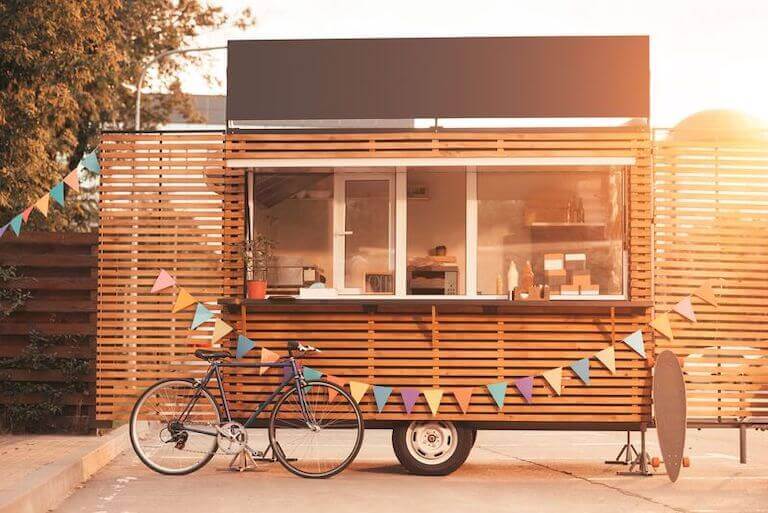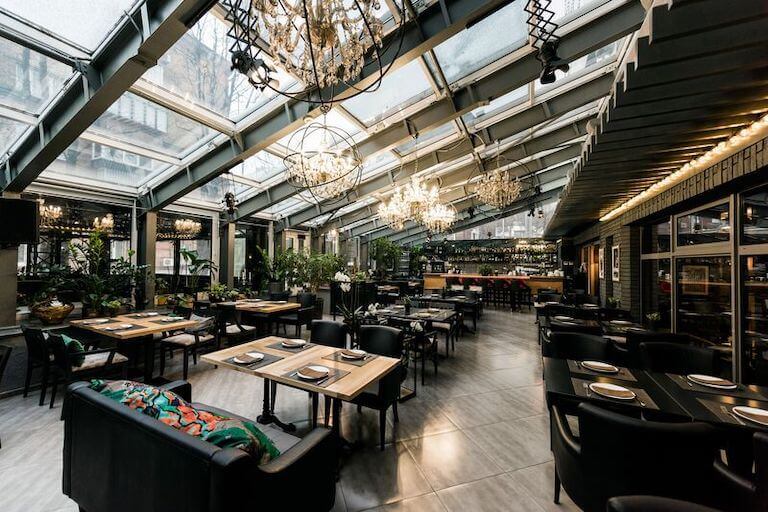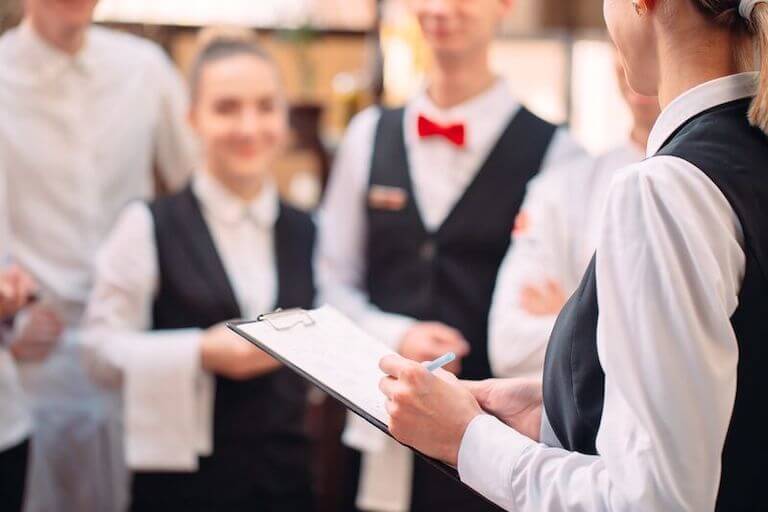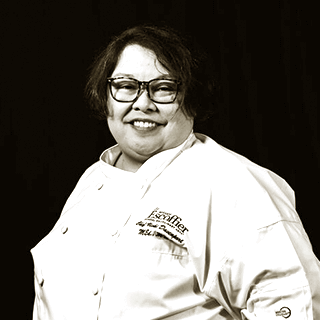Listen to This Article:
It can be thrilling to launch your own restaurant, a business venture that usually consists of several essential “ingredients.” These can include competency in culinary fundamentals, professional business principles, and marketing acumen— not to mention resilience and grit.
Starting this type of endeavor might seem daunting, but if you’re prepared, you can begin to execute your vision. If you’re looking for a concise, step-by-step guide on how to start a restaurant, let’s dive in.
1. Pick a Restaurant Type

A food truck might be a lower-budget and more effective business model option than a traditional restaurant.
Your first step in starting a restaurant is simply brainstorming and choosing a concept that ignites your entrepreneurial spirit. Do you dream of opening a vegan food truck or starting a farm-to-table pop-up restaurant? Perhaps you have your heart set on only serving warm breakfast comfort food.
When picking a restaurant type, also consider the following questions:
- What type of service do you want to offer?
- What does your target audience look like?
- What is your unique brand?
*Information may not reflect every student’s experience. Results and outcomes may be based on several factors, such as geographical region or previous experience.
Consider Low-Cost Restaurant Start-Up Ideas
In this ideation phase, you’ll also want to consider your budget. Even though there are ways to fund your restaurant (keep reading for more on this), you might want to consider some of the following restaurant models if you have minimal money to begin with.
Start a Home-Based Catering Business
With home-based catering, you may be able to cook out of your home, although it’s more likely that you’ll do the cooking from a commercial kitchen space and run the business operation out of your home. This can make catering an economical option, and you can expect lower startup costs than opening a restaurant—somewhere between $10,000 and $50,000.
Start a Ghost Kitchen or Ghost Restaurant
A ghost kitchen or ghost restaurant operates out of a rented commercial kitchen space. Food is delivered to customers through third-party delivery apps like Uber Eats or GrubHub. This can be one of the most affordable ways to start a restaurant. You’ll be leasing your kitchen space, but there’s no dining room or bar to pay for.
According to Entrepreneur Magazine, startup costs for a ghost kitchen are estimated to range between $10,000 and $50,000, and in some cities, local providers offer options below $10,000.
Launch a Food Truck
Starting a food truck is still a significant investment of both money and time, costing between $40,000-$250,000 total. You’ll have to purchase your truck, outfit it with the necessary equipment, and acquire all of the necessary permits.
If you buy a used truck and/or used equipment, you may be able to reduce your startup costs even further. The operating costs might be lower, too, since you can use a tablet-based point of sale (POS) system, and you’ll have much lower utilities and staff costs.
2. Create a Business Plan

It’s vital to create a solid business plan and to keep on top of your numbers.
Now that you’re set on a business idea, it’s time to draft your roadmap to execute on that idea. Think of your business plan as a skeleton outline that details each important component of your foodservice business. At the end of the day, you’ll leverage this business plan to “pitch” potential investors.
Students enrolled in Escoffier’s food entrepreneurship program can engage in a business-oriented curriculum that can help prepare them to start a business plan. They may discuss vetting their food business idea, pitching investors, and forecasting revenue.
5 Essential Business Plan Components:
- Executive summary (i.e., restaurant name)
- Company description (i.e., restaurant model type)
- Competitive analysis (i.e., target market)
- Organization plan (i.e., staffing and customer service policies)
- Financial projections (i.e., investment and funding plan)
Devise a Marketing Plan
Investors will likely want to see a proposed “marketing mix” as part of your business plan. The purpose of this is to gauge how you’ll acquire new customers and keep them loyal through inbound and outbound marketing tactics—combined with paid media. Make sure your marketing plan is thorough and covers effective strategies such as social media marketing, branding, email marketing, SEO, and more.
*Information may not reflect every student’s experience. Results and outcomes may be based on several factors, such as geographical region or previous experience.
3. Choose a Prime Location

Your restaurant’s location can make all the difference in your business success.
What’s one key factor in how restaurants can make money? Location. Location can hold the power to attract your niche target audience. If your restaurant is located on a naturally busy street with lots of organic foot traffic, this can help you attract new customers—visibility is critical.
Think about the type of food you’re serving and how it might resonate in your location. For example, fine-dining Italian might do best in an upscale brick building next to boutique shops. But deli sandwiches and small bites could land better in a casual food truck environment. Also, think about leasing vs. buying a physical space. This can affect your costs and profits immediately.
Essential Location Factors to Consider
- Sizing and capacity
- Neighborhood community
- History of the building
4. Map out Your Menu
After you have your business idea and plan in place, you can begin the creative and slightly technical process of building out your menu offerings. You might want to consider using high-quality, seasonal ingredients when conceptualizing your dishes… also keeping in mind associated costs and how competitors are pricing. Don’t forget to create a great drink menu, too; in many restaurants, beverages drive much of the profits.
Escoffier’s food entrepreneurship curriculum can include dedicated coursework that explores the creation and application of various types of food and beverage menus. Topics may range from visual design to price analysis to making use of available resources.
Menu Pricing Factors to Consider
- Cost of goods sold
- Food cost
- Profit margins
- Sales forecasting
- Inventory
5. Prepare for Restaurant Costs

Creating a spreadsheet can help you keep track of startup costs.
Along with choosing a restaurant space and planning a cost-efficient menu, knowing what goes into additional restaurant costs can help you plan your budget and decide where to splurge and where you can economize. Here are some of the biggest expenses you may face.
Remodeling or Restaurant Improvements
Unlike a residential lease where tenants are expected to leave the space as they found it, it’s not uncommon to invest money into remodeling your commercial space when you rent. For example, you may need to change the size of the kitchen or add a bar. Landlords sometimes provide a “tenant improvement allowance” to offset some of these costs. But the details will depend on your specific lease, so make your requirements clear before signing. And if it’s a property you own, you are typically responsible for all of the costs!
Restaurant Equipment
Ovens, refrigerators, stand mixers, fryers, and commercial dishwashers usually aren’t included with your restaurant space. You’ll probably be responsible for purchasing or leasing this equipment. An exception may be a commercial kitchen rental, which could come with some equipment already built in. When it’s time to buy, you may be able to find some of this equipment second-hand at a reseller or auction.
Restaurant Furniture, Supplies, and Technology
A full-service restaurant requires space for guests to sit and eat. So you’ll need tables, chairs, and barstools for any indoor and outdoor spaces. Plus, you may need a host stand and server stations. There will also be costs like plates, silverware, glassware, linens and towels, menus, and technology like your POS system and your payroll system.
6. Fund Your Restaurant

Evaluate multiple ways to fund your restaurant and explore every option you can find.
So with all those costs in mind, how can you acquire enough capital to start your restaurant? If you have your business plan in place indicating cost projections, this is the time to look into additional funding resources.
Secure Grants
Grants can be a great resource to help you start a restaurant. Auguste Escoffier School of Culinary Arts alumna Tiffany Moore won two grants to get her startup capital.* One was through StreetShares (now known as MeridianLink), which awards grants to military veteran entrepreneurs. The other was through Fiserv, a financial services tech provider that also provides some grants to small businesses.
*Information may not reflect every student’s experience. Results and outcomes may be based on several factors, such as geographical region or previous experience.
Many grants have specific criteria, so it may take some time to find one that you’re eligible for. However, if you do some research, you may find a grant that you can qualify for! These financial gifts usually don’t have to be repaid, and even a small grant of a few thousand dollars could help you to get closer to your funding goals.
Obtain a Business Loan
Some banks and credit unions can provide small business loans, especially if you already have a relationship with those institutions. As long as you carefully manage your expenses and don’t overborrow, outside financing can be a great way to find startup capital.
Some restaurants can get a 504 loan through the U.S. Small Business Administration (SBA). These loans are accessed through a “Certified Development Company” which provides government-backed SBA loans. You can look for qualified lenders in your area.
No matter what type of business loan you choose, realize it can take anywhere from a few weeks to a few months to receive funding. So start the application process early to ensure you have your funds when you need them.
Bring On Private Investors
Private investors can invest in your small business in exchange for a portion of the profits. You can bring them on as partners to handle some of the workloads, or they can be “angel investors” who take a hands-off approach and instead let you run the business on your own—as long as they’re receiving their share of the profits.
Explore Crowdfunding
If you already have a group of people supporting your restaurant concept, crowdfunding may be a fruitful funding option. By pitching your restaurant on platforms like GoFundMe and Kickstarter, you can gain financial support from individuals. And if you’d like, you can encourage donations by offering future rewards like discounted meals or invitations to a soft opening.
7. Obtain Restaurant Licenses and Permits
You’ll need licenses and permits pertinent to the city and state where your restaurant is located. Licenses and permits will also be specific to your restaurant type and whether you plan to sell liquor.
Be aware that some of these can take a long time to obtain, so try to get a head start on this process. Because this process can be complicated, sometimes it’s best to hire a specialized lawyer who can help take care of this more grueling work for you.
Types of Restaurant Licenses You May Need
- Business license issued by the locality
- Employer Identification number (EIN)
- Certificate of occupancy
- Foodservice license
- Food handler’s permit
- Building health permit
- Liquor license
- Sales tax license
8. Hire Qualified Staff

Top-level staff can set the right tone at your restaurant and set you apart from the competition.
Running any restaurant takes a whole crew of dedicated kitchen staff who have the proper training and experience. When hiring, you’ll want to consider the entire brigade de cuisine system, which covers the front and back of the house.
To avoid frequent turnover, ensure you have a thorough interview process in place, check references, see whether chef and management candidates have completed an accredited culinary curriculum. Make sure to train your employees well and to create an environment in which people want to stick around.
Common Restaurant Positions
- General Manager
- Host
- Bartender
- Server
- Busser
- Cashier
- Executive Chef
- Sous Chef
- Prep Cook
- Line Cook
- Dishwasher
- Food Runner
You Opened! Now What?
You made it past the planning stages and maneuvered through the maze of details to make it to opening day. Congratulations, you’re a business owner! Now what?
Now, you work to execute on your business plan and keep improving. This will take a mix of creativity and hard-nosed business acumen as you continually evaluate and tweak your business model. You’ll need to regularly evaluate how your menu offerings are working out, know exactly what your profit margin is, keep abreast of what the competition is up to, stay on top of any staffing issues, and make sure your guests are enjoying themselves and want to return.
For today’s restaurant owner, marketing often means social media engagement and keeping on top of reviews, whether solicited or unsolicited. Customers not only appreciate a good meal, but they often seek a relationship or sense of community as well. If this sounds daunting, you might consider hiring a social media manager as part of your marketing and advertising budget.
Looking further ahead, you might find yourself in a position to expand. It’s never too early to consider your strategy for that scenario, including franchising. When you become a franchisor, you allow others to buy licenses to operate under your brand name and business model; this helps you expand into new locations without having to manage each location yourself.
Begin Your Food Startup Journey…Discover How to Start a Restaurant
When it comes to starting your own restaurant, ensure you have a business plan in place that covers your bases. This may take a thorough understanding of culinary fundamentals, plus business and marketing skills to execute your food startup idea.
If you’re looking for comprehensive guidance on how to launch your own restaurant, consider Escoffier’s Food Entrepreneurship program to get your business idea in motion. Take the next step and start your entrepreneurial journey today.
IF YOU FOUND THIS FOOD ENTREPRENEURSHIP ARTICLE HELPFUL, HERE ARE MORE YOU MIGHT ENJOY:
- How to Start a Bakery Business From Home
- How Gleam & Escoffier’s Mentorship Program Can Guide Aspiring Chefs
- How to Attract the Best Employees for Your Restaurant
This article was originally published on June 18, 2021 and has since been updated.
*Information may not reflect every student’s experience. Results and outcomes may be based on several factors, such as geographical region or previous experience.



